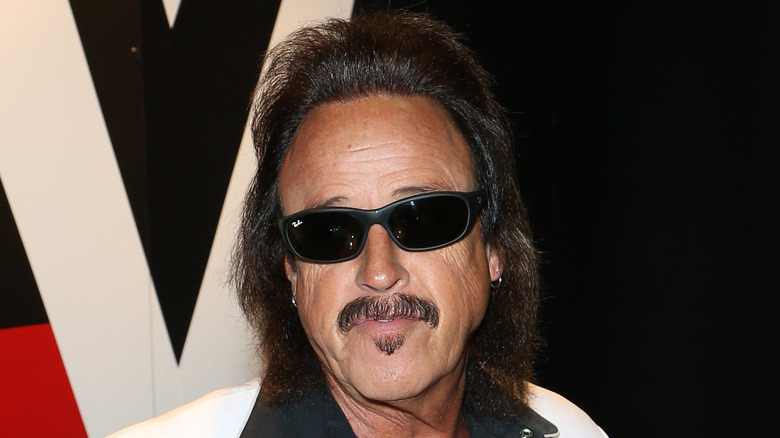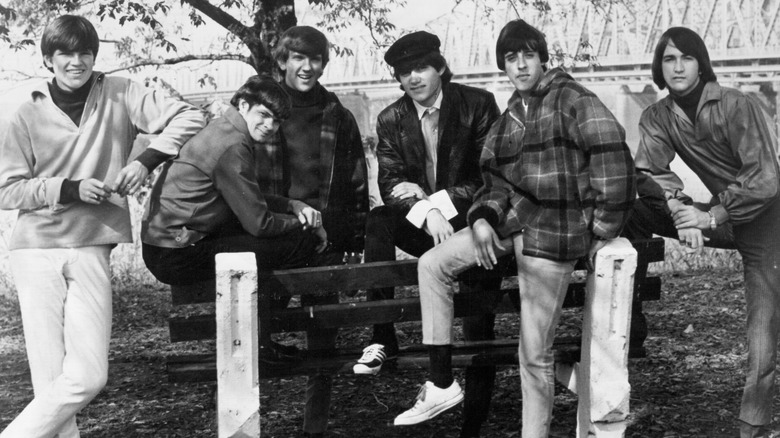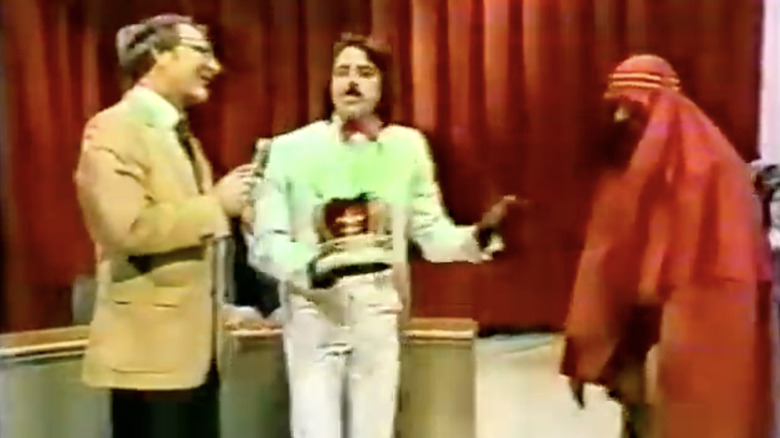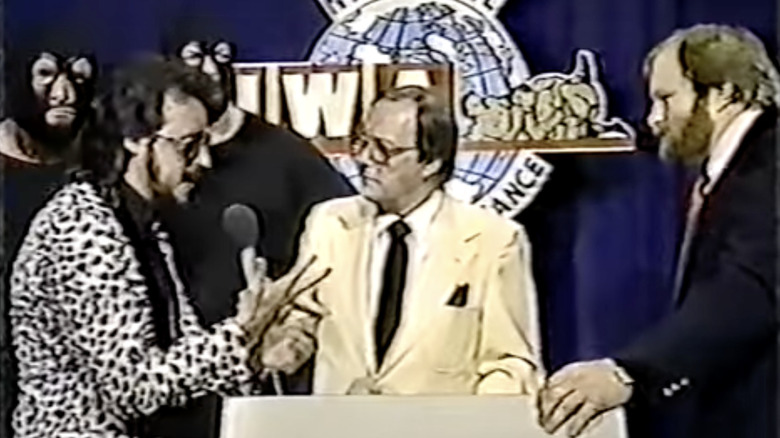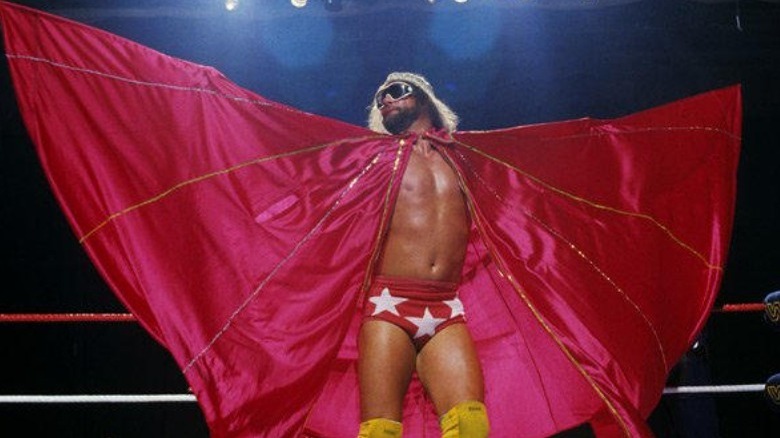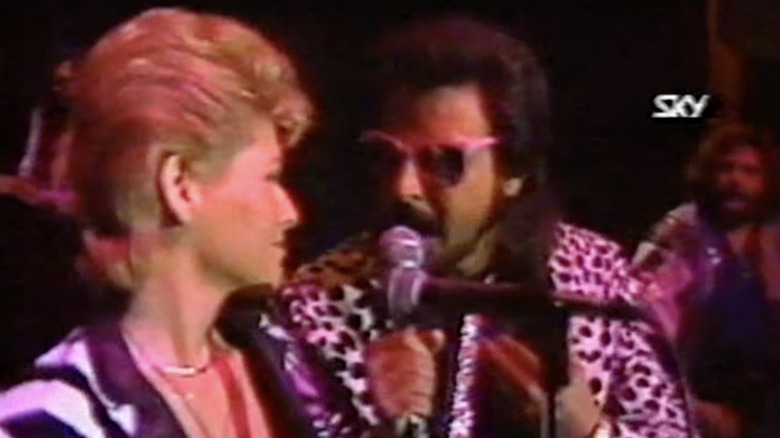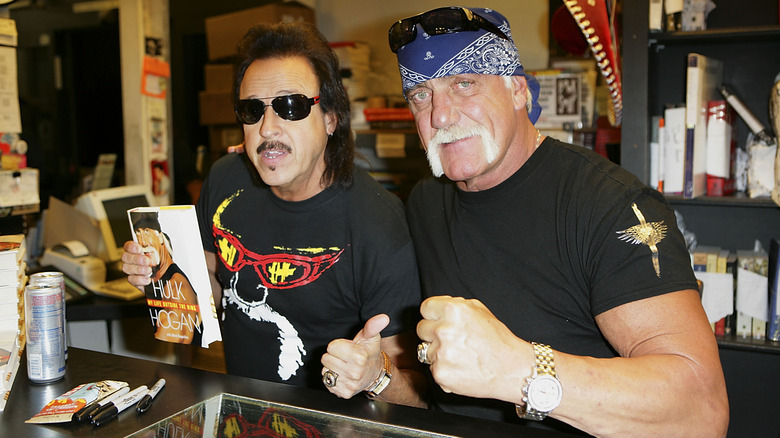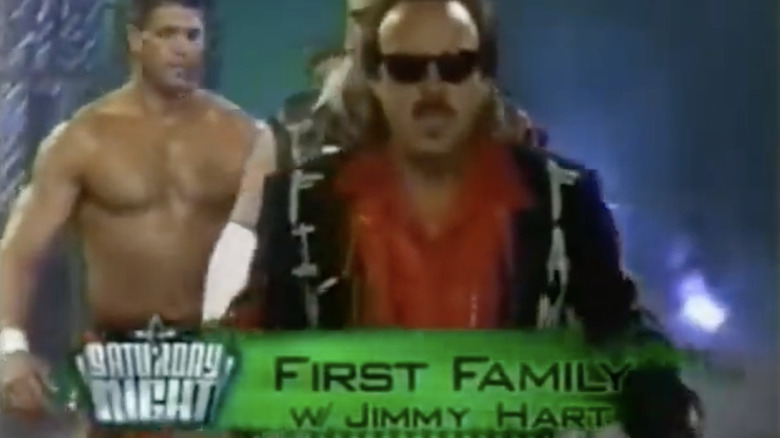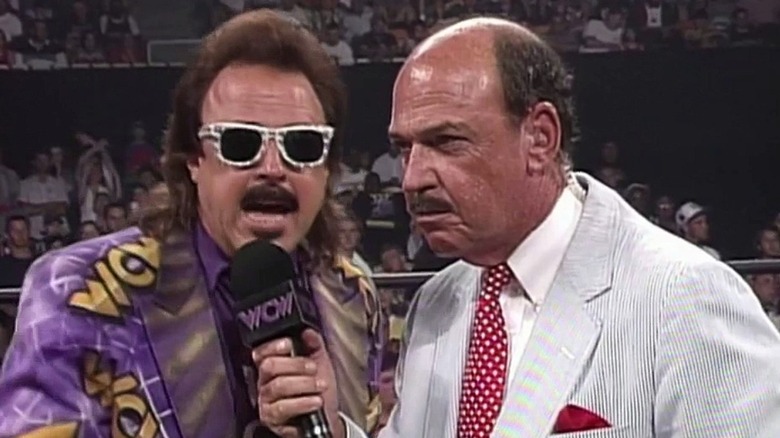Jimmy Hart: Facts Only Hardcore Fans Know About The Mouth Of The South
Best known as "The Mouth of the South," Jimmy Hart has been in the wrestling business for about four and a half decades. Most prominently, he was a heel manager, first as the thorn in the side of Jerry Lawler in the Memphis territory, later as the man who guided Earthquake to injuring Hulk Hogan, and eventually somehow as Hogan's manager and cheerleader in both the WWF and WCW. He did a lot more than that, though: He did public relations work, he helped put up posters in small towns, he wrote television shows, he wrote music, he scouted talent, and he did who knows what else in between. All this while simultaneously being a hated annoyance of a manager in front of the camera and a universally beloved backstage presence behind it.
Jimmy Hart has lived a very interesting life, both in the wrestling business and outside of it, so let's take a look at some facts about him that may not be entirely common knowledge.
He had a hit record (or four)
Jimmy Hart was well into his 30s when he got into the wrestling business, and naturally, he had a whole other life before that. Specifically, he was a musician of some renown, having been a member of two different versions of a band named The Gentrys in the 1960s and early 1970s. In 1965, with Hart on backing vocals, they released "Keep on Dancing," a cover of a 1963 song by The Avantis, an R&B band, which quickly got picked up for national distribution by MGM. The song was a huge hit, peaking at number four on the Billboard Hot 100 pop music chart per the Billboard Database and selling over 1 million copies according to a October 1981 Associated Press profile of Hart. (It spent a total of 13 weeks on the Hot 100, with 11 of those being in the more significant top 40.)
According to Hart's memoir, lead singer and principle arranger Larry Raspberry left the band in 1969 so he could pursue writing his own songs as opposed to The Gentrys' cover-based approach. Hart took over for him, and they quickly released an original song, "Why Should I Cry," that hit the Hot 100 in March 1970, peaking at #61 according to Nostalgia Central. A cover of Neil Young's "Cinnamon Girl" did even better a few months later, peaking at #52 in June, with Hart's book also adding that another cover, this time of Cat Stevens' "Wild World," made it to #97. That was pretty much the end of the Gentrys as a notable entity; whether or not they should be credited with a single hit record or four is up to you.
Jerry Lawler's broken leg was the catalyst for the Jimmy Hart we all know
As explained in his book, Jimmy Hart's involvement with pro wrestling began when he was part of the backing band for a song that Jerry Lawler was releasing locally in the Memphis area. They hit it off, Hart started helping put up posters for the local wrestling shows for extra cash on his days off from performing at the local Ramada hotel, and it eventually led to a storyline where he and The Gentrys performed with Lawler at a wrestling event ... only for Jimmy Valiant to attack Lawler mid-song. This led to, once Lawler turned heel again, Hart being Lawler's manager. Being Jerry Lawler's manager in the late 1970s didn't mean much, though: You barely talked and you assisted Lawler with his use of foreign objects during his matches. That's it.
Then, in early 1980, Lawler broke his leg playing football. And on February 9th of that year, Jimmy Hart: Wrestling Manager came out of his shell.
"That's right, Jerry Lawler broke his leg," explained Hart to announcer Lance Russell. "Big deal, man! You know who broke his leg? [Referee] Jerry Calhoun, baby! Jerry Calhoun broke the man's leg! But listen, I don't want to talk about that anymore. Lemme ask you something, man: If you have a prized racehorse, a thoroughbred, a champion, and he breaks his leg, what do you do to him? WHAT DO YOU DO TO HIM, LANCE? You shoot him, right?! Jerry Lawler is no good to me anymore! He can't make me any more money, baby!"
There was no looking back after that, and Hart became the top villain in the Memphis territory.
The WWF wasn't his first national TV exposure
For the first several years of his wrestling career, Jimmy Hart was exclusively based out of the Memphis territory run owned by Jerry Jarrett, with his national prominence coming once he went to the WWF in 1985. His WWF run, however, was not the first time he had national television exposure. Several months before he went to the WWF, some machinations involving the Jarrett promotion got him a spot as the top heel manager on Championship Wrestling from Georgia, which aired on Saturday mornings on cable's Superstation WTBS.
Specifically, as described by Dick Bourne at the Mid-Atlantic Gateway website, this came about after it was announced on October 20, 1984 that the Jarrett and Georgia promotions were merging with Jim Crockett Promotions out of North Carolina. In actuality, there was no merger: Just a new talent trading agreement to get the Jarrett and Crockett wrestlers on WTBS. Highlights from October-November of 1984 demonstrates how, with the influx of Memphis talent, Hart was quickly positioned as the primary heel manager in the territory, claiming to be a "millionaire playboy" in his debut appearance.
In a promotion that was a bit of a mixed bag, quality-wise, Hart stood out in a big way. "The diamond in the rough here is Jimmy Hart, who takes hyperactivity to new heights in his role as obnoxious wimp manager," wrote wrestling videotape collector John McAdam on his website. "Hart, along with Ole's incompetent booking decisions[,] make this [late 1984 Georgia] tape funny to watch."
He helped the WWF bring in Randy Savage
In February 1985, Jimmy Hart moved on to the rapidly-expanding WWF, where he started as the manager of Greg Valentine and Jim Neidhart. A few months into his run, per the May 30, 2011 issue of the Wrestling Observer Newsletter, WWF booker George Scott saw a tape of Randy Savage wrestling in Memphis and wanted to hire him, but nobody in the WWF knew had his phone number. Scott went to Hart, the recent Memphis mainstay, for help, but he didn't have Savage's number, either. What he did have was enough knowledge of Savage's life to find an opening to call the WMC-TV studio in Memphis and reach him while the wrestlers were there to shoot the weekly "Championship Wrestling" show.
"I couldn't just call and ask for him. I had to be careful," Hart told Bleacher Report's Jonathan Snowden in 2013. "I called the studio when I knew they'd be there for TV and told them I had somebody that wanted to buy $500 worth of Amway. I knew that would get him on the phone." Amway, for the uninitiated, is a multilevel marketing (MLM for short) company dealing in what they describe as "nutrition, beauty, personal care and home products." (Critics, like John Oliver in a November 2016 "Last Week Tonight" segment, decry MLM companies as being glorified pyramid schemes.) "I said 'Look Randy, I lied,'" Hart continued, explaining what he said once he reached Savage. "'If you want to squeal on me, go ahead.' Because I still lived in Memphis and so did Lawler and them and they'd be mad." They met at the gym and, Savage being Savage, he checked Hart for recording devices. Once that was squared away, everything went smoothly.
He wrote a lot of your favorite classic entrance music
While Jimmy Hart's involvement with the musical side of pro wrestling had a few more visible moments, mainly in the form of being the vocalist on a pair of songs on the first two WWF albums in the 1980s, it went much deeper than that. Throughout his time in the WWF and then WCW, he was writing entrance music for various wrestlers, generally with songwriting partners J.J. Maguire (in the WWF) or Howard Helm (in WCW).
"Why don't you and your partner Maguire come up with some original stuff for the second wrestling album?", Maguire recalled Vince McMahon asking of Hart in a 2020 interview with Pro Wrestling Stories. "So we had a chance. There wasn't any guarantee. Vince just wanted us to submit some stuff." Everything blew up from there, to the point that, all told, the Hart/Maguire duo is credited with over 100 songs in the WWE catalog, with Shawn Michaels' "Sexy Boy" theme song being arguably the most famous.
That's just scratching the surface, though: Helm's website says that their partnership in WCW produced over 250 songs. A whopping 60 of the songs that WWE did purchase were included on "Music of WCW" collection that they released on all major streaming services in 2014, featuring everything from more well-known songs like the NWO Wolfpac theme to an unused "Strangers in the Night" knockoff for Tank Abbott's proposed "Tank Sinatra" gimmick.
He turned babyface to make his life easier
Jimmy Hart always had a knack for the promotional and public relations side of the wrestling business. As much as an annoying jerk as he could be on TV, he was universally well-liked outside the ring, and that translated to helping the WWF do local promotion for live events. However, being a heel in that role can be a bit precarious. So in February 1993 he turned babyface, trying to stop his own team, Money Inc., from reinjuring the returning Brutus Beefcake, who had been out of action since a low-flying parasailer crushed his face on July 4, 1990.
"Word we get is that Hart, who specializes in p.r. work well beyond the call of duty, has been wanting to switch face so he can fit into the p.r. end of things better," reported Dave Meltzer in the February 15, 1993 issue of the Wrestling Observer Newsletter. "Traditionally, the role of babyface manager has been the kiss of death long-term." In that week's Pro Wrestling Torch, which had the same cover date, Wade Keller seconded Meltzer's reporting, saying that "Jimmy Hart turned babyface in order to play a more pleasant role in his extensive p.r. work for the WWF, which might be increasing as reports of lawsuits and federal investigations grow." (Keller was referring to how the turn roughly coincided with the WWF suing, among others, the New York Post, columnist Phil Mushnick, and TV personality Geraldo Rivera over their 1992 coverage of sexual misconduct allegations in the WWF.)
He booked WCW Saturday Night separately from the rest of the WCW creative team
In January 1998, WCW's slate of TV programming got a lot more crowded when "WCW Thunder" was introduced as a two hour show on Thursday nights and "WCW Monday Nitro" expanded to three hours. As the prime time weeknight shows, naturally, they would monopolize the most valuable talent and even a lot of the more popular mid-level stars. This meant that "WCW Saturday Night," the old mainstay at 6:05 p.m going back decades on TBS, had become a bit of a lame duck show. In the summer of 1999, though, Jimmy Hart made an effort to liven it up.
"Jimmy Hart proposed to management that he be put in charge of booking WCW Saturday Night," reported Wade Keller in the July 10, 1999 issue of the Pro Wrestling Torch. "There has been talk of overhauling the show. Hart wants to book it Memphis style by pushing some of the younger wrestlers with potential in weekly storylines. Supposedly the idea is extremely popular in the locker room, but the feeling is those who are booking 'Nitro' and 'Thunder' (so poorly) will feel threatened by Hart producing a better show with a talent roster payroll less than one-tenth that of 'Nitro.'" Several weeks later, in the August 21 Torch, Keller reported that it was official: Hart was the new booker of "WCW Saturday Night," and "he will not be given any of the top names to work with but will instead try to get over the younger stars and mid-carders that are already appearing on the show."
He was an employee with full benefits by the end of his WCW run
As noted earlier, Jimmy Hart wore a lot of different hats in his wrestling career, particularly in WCW. He was everything from on-screen talent to the company's main songwriter to part of the creative team, so it would make sense that, being used as a lot more than just talent, he'd have a good shot at being given full employee status with benefits. Regardless of one's feelings about whether wrestlers are misclassified as independent contractors, Hart was doing things in line with what is normally considered worthy of employee status in major pro wrestling companies. Sure enough, he managed to get it.
Hart's employment status in WCW came out as part of the racial discrimination lawsuit that fellow manager Kazuo "Sonny" Onoo filed in February 2000. Though others joined him in filing related lawsuits using the same lawyer (Cary Ichter) that primarily asserted that there was a racially hostile work environment, Onoo's lawsuit had an extra wrinkle. Specifically, he was arguing that he had been misclassified as an independent contractor because he's not white, citing Hart's status as an obvious point of comparison.
In a January 2003 motion, Onoo's lawyers argued that both men were on-screen talent who also "performed various administrative and other duties for WCW," including "recruiting and developing talent," with Onoo also serving as a Spanish and Japanese translator. WCW also "issued Onoo a company credit card, a security key, a business card, and a security clearance" as well as furnishing him with an office, a computer, and an office phone line listed in the company directory, so you can see how the comparison came about.
